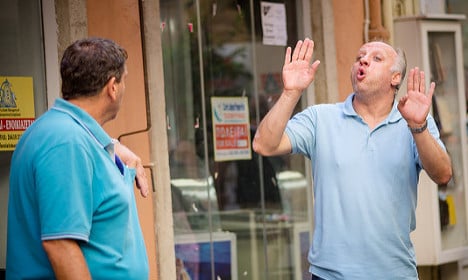Has a French (so-called) friend ever called you a vache espagnole (a Spanish cow) or worse, a lavette (dish cloth)?
The chances are you haven't got a clue what they’re on about or you've got completely the wrong end of the stick.
To help you out and amuse you, The Local has put together a list of some of the weirdest of all French insults. Don't use them lightly. You have been warned.
“Bête comme ses pieds”
 Photo: Andy Polaine/Flickr
Photo: Andy Polaine/Flickr
The English equivalent of this insult – which literally translates as “as stupid as his/her feet” – could be “as thick as a plank”. According to historical records, the French version first appeared in the 19th century. Feet became symbolic for stupidity because they’re the farthest part of the body from the brain.
“Ta mère est tellement petite que sa tête pue des pieds”
Just like the British and the Americans, the French love dragging each other’s mothers into shouting matches. It’s a stiff competition, but this particular insult, which translates as “Your mother is so small her head smells of feet” is possibly the mother of all mother jokes.
“Boudin”
 Photo: Gilles Péris y Saborit/Flickr
Photo: Gilles Péris y Saborit/Flickr
Anyone who has had the misfortune to have tasted boudin (French blood sausage) in their lifetime will know that it’s not pleasant. No surprises then that boudin is also French slang for an ugly woman or an old prostitute. Use with caution.
“Lavette”
You may have worked out from the verb laver that this noun has something to do with cleaning – and technically you wouldn't be wrong. But as well as meaning dish cloth, lavette can be used to refer to a girl who lacks courage and energy.
“Andouille”
 Photo: Bill Smith/Flickr
Photo: Bill Smith/Flickr
Yet another form of sausage has taken on more meanings in the French language. Whilst in English we might jokingly call someone a “silly sausage”, in France andouille, a form of smoked sausage, is also used for a person who is nonchalant or just plain lazy.
“Tête de noeud”
Literally “knot head” this insult has nothing to do with having knotty hair. A more accurate translation would be something slightly ruder like “d$@khead”.
“Espèces de mérinos mal peignés”
 Photo: Maia C/Flickr
Photo: Maia C/Flickr
You may be a fan of Captain Haddock’s famous expletives in the English translation of the Tintin books, but have you ever wondered how they sound in the original French? This expletive, which translates literally as “a badly-groomed merino sheep” refers to a Spanish breed with a distinctive bushy hair-do.
“Blaireau”
Those of you who abide religiously by the more classic style of French dictionary might want to listen up. This insult can be all too easily misconstrued. Blaireau may be French for badger and shaving brush but it is also equally used as an equivalent to “a$$hole”.
“Casse couille”
In English you might say someone is a pain in the ass. But in France if you are annoying enough you are a “nut cracker” or “ball buster”.
“Tu parles français comme une vache espagnole”
 Photo: Vincent Brassinne/Flickr
Photo: Vincent Brassinne/Flickr
You speak French like a Spanish cow? Confusingly, it has nothing to do with sounding Spanish or like a cow. It simply means your accent needs a bit of work.
T'as une tête a faire sauter les plaques d'egouts!
“You've got a face that would blow off manhole covers!” Ouch. Save this one for someone who really deserves it.
Vous êtes une pomme de terre avec le visage d'un cochon d’inde
This very precise insult, which translates to “You are a potato with the face of a guinea pig”, was certainly coined by someone with a very active imagination.
Je te pisse en zig-zags à la raie du cul!
This creative abuse literally means “I piss in zig-zags on your arse crack.” That’s an image we’d like to get out of our heads as soon as possible.
An original version of this story was published on March 5th, 2013.
READ ALSO: La Vache! The strange origins of six French curse words




 Please whitelist us to continue reading.
Please whitelist us to continue reading.
Member comments